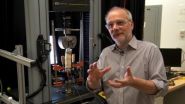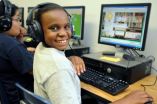(Press-News.org) When a pandemic spreads, health officials must quickly formulate a strategy to limit infections and deaths. That requires sifting through massive amounts of data in a short amount of time and organizing medical personnel who may have little information on the pandemic.
To help coordinate a rapid response to pandemics, a professor at the Georgia Institute of Technology in Atlanta has designed software that combines biological data on the pandemic with demographic data of the at-risk population so that health officials can develop a game plan to limit the pandemic's spread. The software also combs social media sites for real-time information on the pandemic and activities of the population.
Eva Lee, director of the Center for Operations Research in Medicine and HealthCare at the H. Milton Stewart School of Industrial and Systems Engineering at the Georgia Institute of Technology in Atlanta, will talk about her emergency response software at the 2014 AAAS annual meeting in Chicago.
"We have developed a real-time system that will gather the demographics of the region that is being affected, and also pick up on-the-ground-data about who is available and doing what, and about movement of the affected population," Lee said. "Our work is the first to take demographic information and real-time population behavior and interlace it with the biological information to come up with a decision that health officials can actually use."
Lee is the chair of the panel titled "Emergency Response and Community Resilience via Engineering and Computational Advances." The panel is scheduled for Friday, Feb. 14, from 3:00-4:30PM Chicago time.
Lee will share her experience helping federal officials respond to the H1N1 flu in 2009, as well as her experience planning an emergency response to a potential anthrax outbreak. Lee was also involved in coordinating a response to the 2010 earthquake in Haiti, and the decontamination and health screening effort in Japan after the 2011 Fukushima radiological disaster.
Other speakers on the panel include Ronald Eguchi of ImageCat Inc. in Long Beach, Calif, who will talk about inventory data capture tools to assess risk from natural disasters. Yasuaki Sakamoto, of Stevens Institute of Technology in Hoboken, N.J., will speak about improving social media for disaster response.
Emergency responders to a pandemic must quickly gather information on the biological agent to assess the characteristics of the pandemic and decide which treatment would be most effective. They also collect data on the risk factors of the individuals in the pandemic, such as the severity of patient's sickness, and if children or pregnant women are infected.
"The big challenge in a pandemic is how do you use all of this information to determine the best strategy that will give you the minimum number of total infections and mortality rate," Lee said.
Information from Lee's systems approach allows health official to determine where to allocate medical resources and personnel in the best way so that operations will be most successful. Through the software developed in her lab at Georgia Tech, officials can determine, for example, how much vaccine to give at-risk populations and how much to give to the general populations to limit the spread of infection and mortality. Officials can also map where to set up medical sites to avoid traffic gridlock and worsening the pandemic as infected patients converge on treatment sites.
"We can do a real-time optimization to tell you exactly what are the sites that you should set up and who should be going where," Lee said.
INFORMATION:
"Emergency Response and Community Resilience via Engineering and Computational Advances" is scheduled for Friday, Feb. 14, from 3:00-4:30PM local time, at the 2014 AAAS annual meeting in Chicago.
AAAS panel considers pandemic emergency response
2014-02-15
ELSE PRESS RELEASES FROM THIS DATE:
Scientific racism's long history mandates caution
2014-02-15
Racism as a social and scientific concept is reshaped and reborn periodically through the ages and according to a Penn State anthropologist, both medical and scientific researchers need to be careful that the growth of genomics does not bring about another resurgence of scientific racism.
"What we are facing is a time when genomic knowledge widens and gene engineering will be possible and widespread," said Nina Jablonski, Distinguished Professor of Anthropology. "We must constantly monitor how this information on human gene diversity is used and interpreted. Any belief ...
Communicating the way to the adoption of scientific technologies
2014-02-15
CHICAGO --- James N. Druckman has conducted extensive research on the effects of the politicization of science, which occurs when political interests shape the presentation of scientific facts to fit distinct models of "reality."
A paper on this research will be presented during a symposium held from 3 to 4:30 p.m. Friday, Feb. 14, at the annual meeting of the American Association for the Advancement of Science in Grand Ballroom A in the Hyatt Regency Chicago.
Druckman, the Payson S. Wild Professor in the department of political science at the Weinberg College of ...
Study suggests sleep apnea may contribute to fatigue in multiple sclerosis
2014-02-15
DARIEN, IL – A new study provides evidence that obstructive sleep apnea (OSA) is highly prevalent in people with multiple sclerosis (MS), and it suggests that OSA may be a contributor to the fatigue that is one of the most common and debilitating symptoms of MS.
Results show that one-fifth of MS patients surveyed in a large tertiary MS practice carried a diagnosis of OSA, and more than half were found to have an elevated risk for OSA based on a validated screening tool. Further analysis showed that OSA risk was a significant predictor of fatigue severity, even after ...
Heinrich Jaeger to discuss physics of granular materials at AAAS meeting
2014-02-15
Pour sand from a bucket and it flows like a liquid, but stand on it and it supports weight like a solid. This unusual behavior is a property of granular materials, and it is one of the reasons Heinrich Jaeger, the William J. and Alicia Townsend Friedman Professor in Physics at the University of Chicago, has chosen to focus on these types of materials in his research.
Jaeger will present a lecture on "Granular Matter: From Basic Questions to New Concepts and Applications," at the 2014 annual meeting of the American Association for the Advancement of Science. The talk ...
Growing number of chemicals linked with brain disorders in children
2014-02-15
Boston, MA – Toxic chemicals may be triggering the recent increases in neurodevelopmental disabilities among children—such as autism, attention-deficit hyperactivity disorder, and dyslexia—according to a new study from Harvard School of Public Health (HSPH) and Icahn School of Medicine at Mount Sinai. The researchers say a new global prevention strategy to control the use of these substances is urgently needed.
The report will be published online February 15, 2014 in Lancet Neurology.
"The greatest concern is the large numbers of children who are affected by toxic damage ...
Tired all the time: Could undiagnosed sleep problems be making MS patients' fatigue worse?
2014-02-15
ANN ARBOR, Mich. — People with multiple sclerosis (MS) might assume that the fatigue they often feel just comes with the territory of their chronic neurological condition.
But a new University of Michigan study suggests that a large proportion of MS patients may have an undiagnosed sleep disorder that is also known to cause fatigue. And that disorder – obstructive sleep apnea – is a treatable condition.
In the latest issue of the Journal of Clinical Sleep Medicine, researchers from the U-M Health System's Sleep Disorders Center report the results of a study involving ...
Can citrus ward off your risk of stroke?
2014-02-15
PHILADELPHIA – Eating foods that contain vitamin C may reduce your risk of the most common type of hemorrhagic stroke, according to a study released today that will be presented at the American Academy of Neurology's 66th Annual Meeting in Philadelphia, April 26 to May 3, 2014.
Vitamin C is found in fruits and vegetables such as oranges, papaya, peppers, broccoli and strawberries. Hemorrhagic stroke is less common than ischemic stroke, but is more often deadly.
The study involved 65 people who had experienced an intracerebral hemorrhagic stroke, or a blood vessel rupture ...
Cognitive behavioral therapy for insomnia can reduce health care utilization and costs
2014-02-15
DARIEN, IL – A new study is the first to show decreases in health care utilization and costs following brief treatment with cognitive behavioral therapy for insomnia (CBTI).
Results show that sleep improved in 86 percent of insomnia patients who completed at least three sessions of CBTI. In the six months following treatment, health care utilization decreased and health care-related costs were reduced by more than $200 on average among treatment completers.
"Cognitive behavioral therapy for insomnia is a highly effective treatment, and this study shows that a relatively ...
Is truth stranger than fiction? Yes, especially for science fiction
2014-02-15
CHICAGO – From warp drives to hyperspace, science fiction has continuously borrowed from, and sometimes anticipated, the state of the art in scientific progress. This has resulted in the perception that science and science fiction have a causal relationship, one finding direction from and fulfilling the science fantasy laid out before it.
But that is rarely the case, according to Lawrence Krauss, a Foundation professor in the School of Space and Earth Exploration and the Department of Physics at Arizona State University. No doubt, science fiction has taken inspiration ...
Citizenship education goes digital
2014-02-15
WACO, Texas (Feb. 14, 2014) --Can playing online video games help students learn civics education? According to Baylor University researchers, the answer is yes.
Brooke Blevins, Ph.D., assistant professor of curriculum and instruction and Karon LeCompte, Ph.D., assistant professor of curriculum and instruction in Baylor's School of Education studied the effectiveness of iCivics, a free online website founded by retired Supreme Court Justice Sandra Day O'Connor that teaches civics concepts using 19 educational games.
The study, published in The Journal of Social Studies ...



